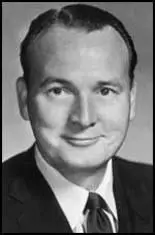John Henry Faulk

John Henry Faulk, the son of Henry Faulk and his wife Martha Miner Faulk, was born in Austin, Texas, on 21st August, 1913. His father was an illiterate sharecropper who eventually went to the University of Texas and became a lawyer. A committed socialist he was candidate for Governor of Texas but was beaten by Samuel Lanham. His mother, a schoolteacher, also held progressive views, and he was brought up as a supporter of civil rights.
Faulk entered University of Texas in 1932 and under the influence of J. Frank Dobie, Walter Prescott Webb and Roy Bedichek, he developed a strong interest in Folklore. He shared Bedichek's political views and was a great supporter of Franklin D. Roosevelt and the New Deal. He also joined the American Civil Liberties Union. In 1940 he became a part-time English teacher at the university.
During the Second World War Faulk was rejected by the United States Army for medical reasons. In 1943, Faulk spent the year in Egypt serving the American Red Cross. On his return in 1944 he was allowed to join the army and served as a medic. While a soldier at Camp Swift, Faulk began writing his own radio scripts and in 1946 began his own radio show on WOV. After a spell working for New Jersey station, WPAT, he joined WCBS for a four-hour morning talk show, the John Henry Faulk Show. Page S. Foshee has argued: "Radio provided Faulk the audience he, as a storyteller, craved... The program, which featured music, political humor, and listener participation, ran for six years." Studs Terkel described him as a storyteller in the tradition of Mark Twain.
Faulk was an active member of the American Federation of Television and Radio Artists. At the time there was a struggle for control between conservative and liberal members. Faulk was determined that the actors' union take a stand against the McCarthyite practice of blacklisting entertainers with alleged connections to the American Communist Party. Faulk and his friends eventually gained control of the organisation.This upset Vincent Hartnett, the publisher of Red Channels and the founder of Aware, which published a series of bulletins that were distributed to industry executives about the political views of potential employees. The organization was funded by Lawrence A. Johnson, the owner of a chain of supermarkets in Syracuse. According to Victor S. Navasky, the author of Naming Names (1980): "Since about 60 percent of television advertising revenue came from goods sold in supermarkets, Johnson's campaign was effective."
Faulk lost his job and later discovered that Aware had labeled him a communist because of his involvement in the American Federation of Television and Radio Artists union. With the encouragement and financial support of Edward R. Murrow, Faulk sued Hartnett and Johnson. Faulk engaged New York attorney Louis Nizer to take his case whereas Roy Cohn appeared for the defence.
After a long delay, the trial finally opened on 23rd April, 1962, in the New York State Supreme Court, presided over by Justice Abraham Geller. During the trial, Faulk’s attorney Nizer proved the existence of the blacklist and its detrimental impact to Faulk's standard of living. The trial ended with a jury award of $3.5 million, the largest libel award in U.S. legal history at that time. The defendants' appeals resulted in the reduction of the damages to $500,000.
Co-defendant Lawrence A. Johnson passed away the day the verdict was reached, forcing the court to appoint a temporary administrator. Faulk eventually settled out of court with Johnson's estate for $175,000. Co-defendant Vincent Hartnett became destitute during the trial and appeal proceedings, making it difficult for Faulk to collect damages.
Despite the success with the court-case, CBS refused to rehire Faulk. Unable to find work in the media he wrote a book about his experience of the blacklist, Fear on Trial (1963). He also wrote and produced two one-man plays. Deep in the Heart and Pear Orchard . According to Page S. Foshee, Faulk "portrayed characters imbued with the best of human instincts and the worst of cultural prejudices."
John Henry Faulk died on 9th April, 1990.
Primary Sources
(1) Victor S. Navasky, Naming Names (1980)
In 1962 John Henry Faulk was awarded $3.5 million (later reduced to $550,000) in his six-year libel suit against his blacklisters - the fanatical Lawrence A. Johnson, owner of a chain of supermarkets in Syracuse, New York, who had mounted a campaign based largely on material from Counterattack and aimed directly at sponsors, agencies, and networks to prevent them from employing Faulk and other of "Stalin's little agents." Since about 60 percent of television advertising revenue came from goods sold in supermarkets, Johnson's campaign was effective. Other defendants in Faulk's suit were the professional anti-Communist Vincent Hartnett and his Aware, Inc., the organization which cleared for a fee the performers it exposed.
